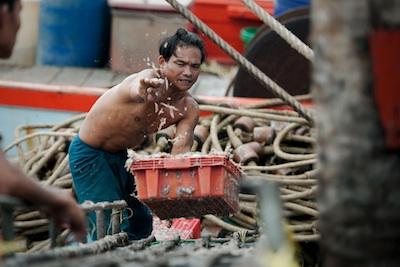US State Department: forced labor on Thai fishing vessels still ignored
A migrant laborer sorting fish on a Thai vessel in 2011.
For migrant workers trapped in slavery-like conditions on Thai fishing trawlers, the odds of being rescued by authorities remain slim.
But they're apparently not slim enough to merit the U.S. State Department knocking Thailand down to its lowest human-trafficking ranking. That very real threat, which carries the penalty of aid sanctions, was not meted out on Thailand in America's recently released Trafficking in Persons report. Each year, the State Department analyzes countries' efforts at halting trafficking and forced labor.
Global Post's recent investigation into the plight of seafaring migrants duped into slavery, "Seafood Slavery," suggested a shockingly frequency of murder on Thai boats. Equally discomforting is the link between the fish they snare and the American supermarket, which is partially supplied by an invisible deep-sea supply chain.
Thailand has dodged a bullet by holding on to its "watch list" status and hovering just above the worst ranking.
But is the government's enforcement improving?
Not really, according to the new report.
Last year's report determined that inspections of potentially abusive vessels were "practically nonexistent."
This year, the State Department contends that the government upped its investigations into this crime to three. Thailand's navy, according to the report, conducted "more than 1,000" inspections of long-haul boats and intercepted "thousands of undocumented migrant workers … a population likely to contain trafficking victims." But it didn't identify a single one.
Without a special waiver, countries hit twice in a row with the second-to-last ranking, "Tier Two Watchlist," are meant to be bumped down to the worst ranking. It appears that Thailand got its waiver. It has now wallowed in this category for three years.
As one deputy boat captain told me two months ago: "Once a captain is tired of a guy, he’s sold to another captain for profit … a guy can be out there for 10 years just getting sold over and over.”
The story you just read is accessible and free to all because thousands of listeners and readers contribute to our nonprofit newsroom. We go deep to bring you the human-centered international reporting that you know you can trust. To do this work and to do it well, we rely on the support of our listeners. If you appreciated our coverage this year, if there was a story that made you pause or a song that moved you, would you consider making a gift to sustain our work through 2024 and beyond?
